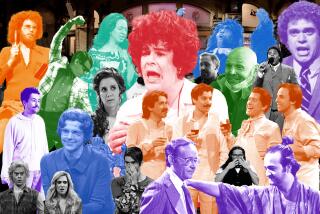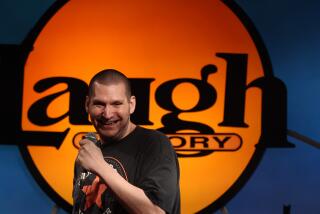Yesterday’s Yuks Still Echo
ASPEN, Colo. — “Comedy is really simple. It’s based on mischief and silliness,” Jerry Lewis said at the U.S. Comedy Arts Festival.
“T.S. Eliot said simplicity is difficult because it requires nothing less than absolutely everything. That’s comedy. Get the laugh, kid. And damn, get the laugh but not at the sake of losing your dignity.”
Dignity was all over the place at Aspen, which in its sixth year has jelled into one of the premier comedy festivals, drawing big names for reunion tributes, stand-up shows, alternative sketches, film screenings and restaurant schmoozing.
Lewis took the spotlight on the festival’s closing day, looking good for a man who has been making people laugh for 68 years. The skinny teenager who screamed “Laaady!” in his signature Kid voice, the thousands of pratfalls, the wild energy that made masterpieces of controlled anarchy--they were all with Lewis as he sat on stage with Martin Short, sipping red wine, screwing up the fleshy and worn face like an aged clown to a delighted and packed house. Lewis was in his element.
It’s difficult to remember what it was that made Lewis and partner Dean Martin a sensation from 1946 to 1956, earning millions of dollars on movies when tickets cost 35 cents. But as soon as clips from “The Colgate Comedy Hour,” “The Jerry Lewis Show” and the movie “The Bellboy” were shown, it became evident. In terms of sheer physical talent, Lewis is in the ranks of Buster Keaton and Charlie Chaplin. There’s no question who taught Jim Carrey. The spontaneity, the reckless physicality. It’s comedy that transcends language.
Lewis was the one honored comedian at Aspen this year who wasn’t looking at his watch. Or thinking about it. “I love being here,” he said. And he meant it. He was “born in the trunk,” as he said, his parents being in vaudeville. Comedy was in his blood. “No matter what kind of s--- you are at the end of the day, you’re almost pure by the fact that there are people who think that what you did was OK,” he said.
Lewis Remembers a Gig
at Gangster-Run Club
When Lewis met Martin, he was 18. Dean was 28. Their first performance together was at the 500 Club, a Mafioso club in Atlantic City. The club owner came into their dressing room and demanded, “Where’s the funny crap?” Lewis recalled. “We had pastrami sandwiches. I ripped the brown bag with the stain on it and started to write bits because we would have had cement shoes. This was upper-scale Mafioso, a slash in the throat was like any afternoon. I never wrote better in my life! We played eight people in a room that sat 250, and we did two hours and 40 minutes. Two nights later there were a thousand people looking to get in. That was the beginning.”
The Playboy and the Putz made history. It would carry them until they famously broke up 10 years later. For a good portion of the show, Lewis lionized his late ex-partner. “Dean had a genius in his bones that he wasn’t aware of,” Lewis said. “He was the most powerful talent that I’ve ever seen in my life--the most underrated performer that ever lived in the history of show business.”
Aspen also paid tribute to Elaine May and Mike Nichols, the witty and urbane sketch duo who hit it big in the late ‘50s. They had split by 1962. It was a brief yet brilliant run. It changed comedy. The two met at the University of Chicago improv theater group the Compass Players, which would later become Second City. It was a casual meeting. They still hadn’t been formally introduced when they ran into each other at a railroad station and without any preliminary conversation launched into improv “for the other people in the waiting room,” May said at the Friday program.
Nichols and May’s Wit,
Sophistication Still Intact
Moderator Steve Martin was incredulous and asked, “Just like that? When you finished, did you introduce yourself, like ‘Hi, I’m Elaine,’ or ‘Hi, I’m Mike?’ ” “No. We went straight to her house,” said Nichols, deadpan. The audience got it.
“Elaine’s brilliance was always to do the opposite of what you expected,” said Nichols. When she would play the madam of a whorehouse, she would say, “Now don’t forget, say hello to your mother for me.”
The wit was still there. The aloof sophistication. Despite the fact that neither Nichols nor May likes giving interviews, Steve Martin gave it his best shot. “Were there moments of revelation either alone or together that you still recall as being significant in your lives or for your comedy?” Silence. “Well, or what’s your favorite color?”
“Maybe you can ask me some questions,” Martin tried. “I told you I would be awful at this,” said May, as she reached for a bottle of Evian. “Now you’re turning on me.” “That’s my water,” said Martin.
“Chicago was not a fashion-driven place. No one was like ‘Come and see these fabulous people.’ Nobody cares,” Nichols said. “They come, they sort of fill the place, they laugh and they go home. They’re not impressed with anything, which is the best possible training for anybody.”
“Thank God none of them are here tonight,” said Martin.
At the end of the evening, during the question-and-answer session, Tom Smothers stood and asked, “Were you lovers or not?” to which May replied, “Yes, we were lovers or not.”
Tom and his brother Dick were honored earlier in the day, as 2000 marks their 30th anniversary of being fired from CBS, and losing their comedy-variety show. But the dangerous thing about a “tribute” is that it makes the comedian take a seat, and brings in a panel of people to reminisce, who may or may not have something to say.
‘Smothers Brothers’
Alumni Gather Onstage
Joined onstage by the original writers for “The Smothers Brothers Comedy Hour”--Steve Martin, Mason Williams, Bob Einstein--with “Politically Incorrect” talk show host Bill Maher as moderator, Dick and Tom looked more like conventional men in their early 60s than comics.
“In these shows, you don’t get to complete a thought,” Dick said. “It’s like watching a bunch of people who in so many minutes think they have to say a lot.”
While the panel discussion oscillated between strained and genuine, there were some worthy anecdotes for die-hard Smothers fans. How Williams gave Steve Martin his break as a writer, paying him $300 a week out of his own pocket. The time when they had Kate Smith dressed as Oliver Hardy, with Smith enraged, yelling to Einstein, “I’m walking off this stage because of you!” The time when Tom admitted to divesting himself of his properties so he could afford being sued. Einstein wailing, “Thanks for telling us! I was buying houses!” “I was driving a Jaguar when we got fired,” Martin quipped.
The free-for-all memory-lane became a little disjointed when former series writer Einstein became loud and started to interrupt Maher in mid-sentence. He was on a roll and wasn’t planning on stopping. Maher incorporated it into the “act,” facing the packed audience in the converted gymnasium and saying, “Will someone please give Bob a job!”
Clips Show Smothers’
Irreverent Style
The clips from their prime-time show that rocked the establishment reminded those audience members who weren’t born back then how irreverent the show was. One skit portrayed a black man and a white woman standing at the altar exchanging their wedding vows. The priest turns to the side and says, “The rope please.”
The real highlight was their live show, “The Smothers Brothers Live,” performed on Saturday. They were as good as they’ve ever been. Their banter was smooth, with Tom the rebel and Dick the straight man who “Mom always liked best.” The show’s guest lineup represented more of a ‘90s sense of humor, embodied by the self-referential Spalding Gray, the four-letter, sex-driven comedy of Bobby Slayton and the political humor of Maher, who while commenting about a South American country wanting to replace coco crops with chrysanthemums and bananas said, “Did you ever try to get a hooker back to the room with a banana and a chrysanthemum?”
In addition to comedy, Williams played his Grammy-winning instrumental “Classical Gas” with Ken Kesey’s guitar, and Tom’s Yo-Yo Man made an appearance, to the delight of fans.
More to Read
The biggest entertainment stories
Get our big stories about Hollywood, film, television, music, arts, culture and more right in your inbox as soon as they publish.
You may occasionally receive promotional content from the Los Angeles Times.










